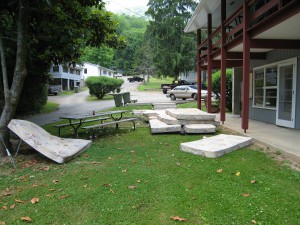Welcome to Around the Web, where Savage Minds maintains a green-ethos by recycling old links.
Mosques in America
- Perhaps unsurpisingly opposition to the “Ground Zero mosque” is spawning general opposition to mosques in the United States as visibility is translating into hostility for Muslims in America. This after a Time magazine poll found that 43 percent of Americans hold unfavorable views of Muslims. Could the public debate in the U.S. be edging closer to the much more bitter conflict in Europe that has had France banning facial veils and Switzerland banning minarets?
Neurology supports anthropology on gender as learned behavior
- In the new book, Delusions of Gender, brain researcher Cordelia Fine argues that while there may be slight variations in the brains of women and men the wiring is soft, not hard. “It is flexible, malleable and changeable.” Larry Summers be damned!
- Language Log has an appreciation and links to reviews.
James Bond, cultural anthropologist
- Movie buffs already know that the future of the James Bond franchise is uncertain. But Hollywood screenwriters are betting on his return with this potential screenplay where the British secret agent ventures into the Sahara to meet the Taureg people of uranium rich West Africa and find an American anthropologist who is seeking to help a former research subject who has been accused of a terrorist attack. Cultural anthropologist Michael Lieber, formerly of UCLA, is co-credited with the original concept.
Texting in Africa
- In Africa as many as 30 percent of malaria drugs may be fake. A new program in Nigeria provides consumers with a code on the drug’s packaging that can be sent via text message to a hotline. A reply of ‘OK’ verifies the legitimacy of the medicine.
Race in the Gilded Age
- An intriguing book reviewed by NPR explores the changing notions of race in the United States after the Civil War through the case of a man who lived a double life. As a Black man living in Brooklyn he went by James Todd, married a Black woman, and had a decent job as a physical laborer. As a White man he was Clarence King, a scientist and well connected socialite.
Chimp invents backscratcher
- For many primatologists human culture differs from that of apes only by degree, not in kind. Researchers of a wild chimpanzee community in Uganda observed a male with partially paralyzed hands using a vine to scratch his back. The practice subsequently spread to seven, perfectly healthy chimps.
Recent archaeological finds
- In the UK archaeologists from the universities of Manchester and York have dated a residential structure, associated with the archaeologically rich Star Carr site, to 10,500 years old. “This changes our ideas of the lives of the first settlers to move back into Britain after the end of the last ice age.”
- In southeastern Georgia near the border with South Carolina, a significant discovery of a Confederate prison known as Camp Lawton. There were no above ground remains of the prison as Union troops burned it to the ground after capturing it, so its exact location has remained a mystery until now.
“Breastfeeding: It’s what your tits are for” Whip ’em out and enjoy this great celebrity PSA:
You can contribute to Around the Web by emailing your links to me at mdthomps AT odu.edu

